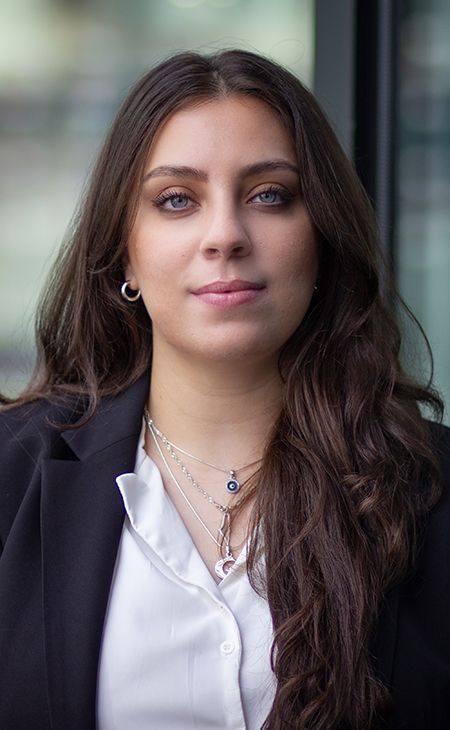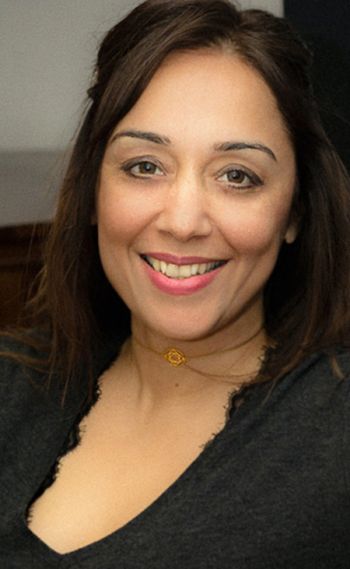A Place to Be Herself
Jumana Abdelrahman's journey from first-generation law student to civil litigator.

Law Clerk, Cassiday Schade LLP
Jumana Abdelrahman's journey from first-generation law student to civil litigator.
“My identity is kind of why I went to law school, to be honest,” says Jumana Abdelrahman ’23.
“I think as a Palestinian, as an Arab, and as a Muslim, in the media, in the law, in policy, my identity is talked at,” she adds. “My whole life, I felt talked at and talked about. I never felt like I was a part of that conversation.”
Abdelrahman came to Chicago-Kent College of Law to change that. She was raised to believe that her voice matters, and to speak up when she has something to say.
“My voice will be heard. My opinions will be heard,” she says. “To Chicago-Kent’s credit, they’ve always listened.”
Abdelrahman found success at Chicago-Kent, winning Best Advocate Awards at trial competitions as part of Chicago-Kent’s Trial Team and completing internships, but it was not always an easy journey.
Being a first-generation student of immigrant parents meant that she did not have the institutional knowledge that many of her peers took for granted.
“I didn’t even know what the word litigation meant when I was a 1L,” she says.
Now, Abdelrahman specializes in civil litigation. She currently works as a law clerk at a civil litigation defense firm. There, she’s learned that everything that makes her different is not a liability, it is an asset.
“So much of the law is about client interaction,” she says. “In a high-intensity situation, like a deposition, it’s a comfort to look across the room at the team defending you and see someone who looks like you, knowing that the attorney will understand the unspoken things that get lost in cultural translation, or in literal language translation.”
She says first-generation students and those from other underrepresented backgrounds bring a multitude of assets to the legal profession.
“Things like adaptability,” she says. “I have perseverance, discipline. When you are first-generation, when you have no legacy, you have no choice but to over-prepare, over-research, over-everything because you have no choice. Nothing prepares me except myself.”
It took Abdelrahman time to feel confident.
Her first months at Chicago-Kent were hard. She did not yet realize everything she could bring to the table.
“My 1L year I was ready to drop out of school because I found it so hard socially,” she says. “It had nothing to do with academics. I felt like I just couldn’t succeed in the legal field being first generation.”
She found her way to a First-Generation Law Student Association event, where she found all the validation she needed to keep going. Abdelrahman is now the president of the First-Generation Law Student Association, and also serves as vice president of the Muslim Law Student Association and as a 3L representative for Chicago-Kent’s chapter of Women in Law.
“I think the executive board sensed that I was ready to jump ship. They asked if I was OK, and I said no,” she recalls. “They told me that my struggle was different from my legacy peers, and that it was real, and there are ways to adapt and deal with it to make it an asset.”
It was like a switch went off.
Now, as president of the organization, she can offer the same guidance to incoming students.
“It’s so healing to my 1L self to be able to give the 1Ls what I wished I could have had—to give them support, to sit them down and tell them what litigation is, what moot court means,” she says.
Since she began to get involved in extracurriculars, Abdelrahman’s experience at Chicago-Kent has changed. She found support and solidarity in other diversity organizations. The student body has always delivered support when she has asked for it.
“I needed to be able to have my diversity celebrated,” she says.
For example, in the 2021–22 school year, she felt that Muslim holidays should be added to the academic calendar and should join the other two Abrahamic Religions already included in the calendar. She, along with the rest of the MLSA Executive Board, created a petition and asked for student support.
“Within six days, we had a third of the student body signed on,” she remembers. “I felt so supported, especially by my peers. They rally behind us. When I speak, I feel they listen.”
During her time at Chicago-Kent, Abdelrahman completed internships at Prairie Legal Services, Inc. and in the Chicago-Kent Immigration Clinic. She also volunteers regularly at Ascend Justice and Together We Cope, where she assists survivors of domestic violence and those experiencing homelessness.
“On a human level, we should not be walking around with blinders on,” she says. “A part of that is my Muslim faith coming in, saying that it’s unacceptable to just think about myself. It’s an expectation and requirement to be giving back to your community both monetarily and with your time.”
Abdelrahman chose to attend Chicago-Kent on the basis that she believed she would always feel supported.
Looking back on that decision from three years ago, she has no regrets.
“What matters more than any statistics that Chicago-Kent can ever put out, is that when I got here, for the last three years, my peers have supported me,” she continues.
Photo provided


